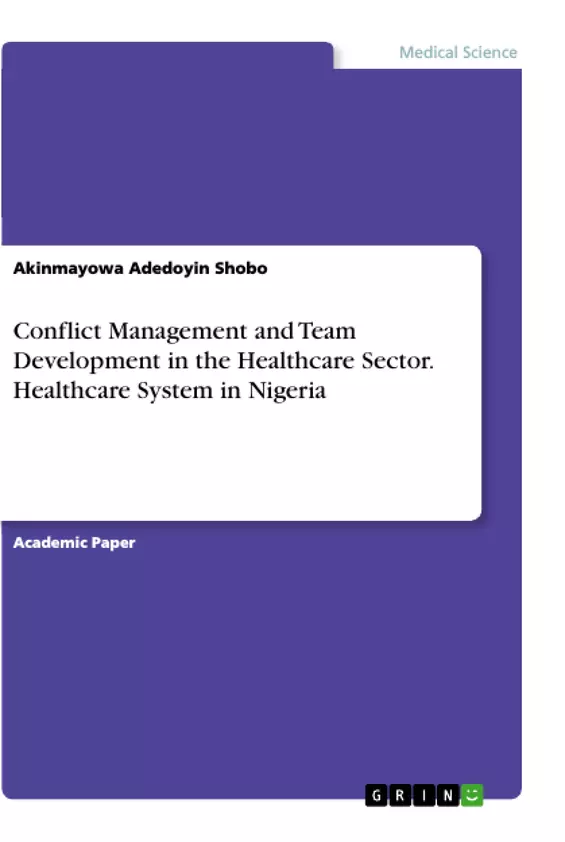This paper spotlights several empirical thoughts on team development and conflict management in relation to the Nigerian healthcare setting. The subject of conflict is gaining more interest among stakeholders in all spheres of life. There’s been various perspectives owing to the roles often played by conflicts at the national and international levels. The focus of this work; however, is limited to conflicts within an organization – specifically the healthcare organization in Nigeria.
Team development has been studied and characterized by organizational theorists and administrators as it concerns organizational performance. In the healthcare setting, maintaining highly functional teams has been advocated for many reasons including (a) the prevention of avoidable adverse events partly due to inadequacy of communication channels among clinicians. (b) The avoidance of unnecessary waste and cost due to a lack of clarity in purpose. (c) Decreasing the risk of medical errors as a result of the incompetence among the team of healthcare professionals.
In the Nigerian context, experts have also identified some barriers to effective team development. The Nigerian healthcare sector has perennially suffered from the outcomes of conflicts among various stakeholders that make up the overall healthcare system. In view of these negative consequences of such conflicts (for example industrial action leading to termination of healthcare services every year); there’s been a rise in the phenomenon of medical tourism among certain privileged segments of the Nigerian society, leaving the majority of the population vulnerable.
Inhaltsverzeichnis (Table of Contents)
- Defining Conflict
- Theories of Conflict
- Conflict Types
- Etiology of Conflict
- Consequences of Conflict
- Positive Implications of Conflict
- Negative Implications of Conflict
- Risk Factors to Conflict
- Phenomenon of Team
- Leadership and Team Development
- Deciphering the Role of Leadership in Leading Team
- Theoretical Models in Team Development
- Leadership Style and Stages of Team Development
- Communication and Team Development
- Healthcare System in Nigeria
- Healthcare Workers and Nigeria Healthcare Institutions
- Impact of Team Work in Healthcare Institution
- Barriers to Team Development
- Conflict and Nigeria Healthcare Sector
- Conflict Management
- Conflict Management Styles
Zielsetzung und Themenschwerpunkte (Objectives and Key Themes)
This work explores the interplay of conflict and team development within the Nigerian healthcare sector. Its goal is to analyze the various perspectives on conflict in organizations and understand how they impact healthcare institutions in Nigeria. The work examines how team development practices and effective leadership can mitigate the negative effects of conflict and contribute to better patient care outcomes.
- The nature and dynamics of conflict in healthcare organizations
- The role of leadership and communication in team development
- Barriers to effective team development in the Nigerian context
- Strategies for conflict management within healthcare settings
- The impact of conflict and team development on patient care outcomes
Zusammenfassung der Kapitel (Chapter Summaries)
The first chapter introduces the concept of conflict, exploring its various definitions, theories, types, and consequences. The chapter discusses the potential positive and negative implications of conflict within organizational settings, outlining factors that contribute to its emergence. It then shifts to the phenomenon of teams, emphasizing the significance of effective teamwork in organizational performance.
Chapter two examines the crucial role of leadership in team development, highlighting various leadership styles and their impact on team dynamics. The chapter delves into theoretical models of team development, exploring the stages of team growth and the factors that influence team effectiveness. It also discusses the importance of communication in fostering successful teams.
Chapter three provides an overview of the healthcare system in Nigeria, emphasizing the challenges faced by healthcare institutions and the crucial role of healthcare workers in delivering quality care. It explores the impact of teamwork on the effectiveness of healthcare institutions and highlights the barriers to team development in the Nigerian context.
The final chapter focuses on the issue of conflict within the Nigerian healthcare sector, exploring the consequences of conflict on the overall healthcare system. It analyzes different conflict management styles and discusses strategies for effectively resolving conflicts in healthcare settings.
Schlüsselwörter (Keywords)
Key terms and concepts covered in this work include: conflict management, team development, leadership styles, communication, healthcare system, Nigerian healthcare sector, healthcare workers, patient care, barriers to team development, and conflict resolution strategies.
- Quote paper
- Akinmayowa Adedoyin Shobo (Author), 2021, Conflict Management and Team Development in the Healthcare Sector. Healthcare System in Nigeria, Munich, GRIN Verlag, https://www.grin.com/document/1014980



